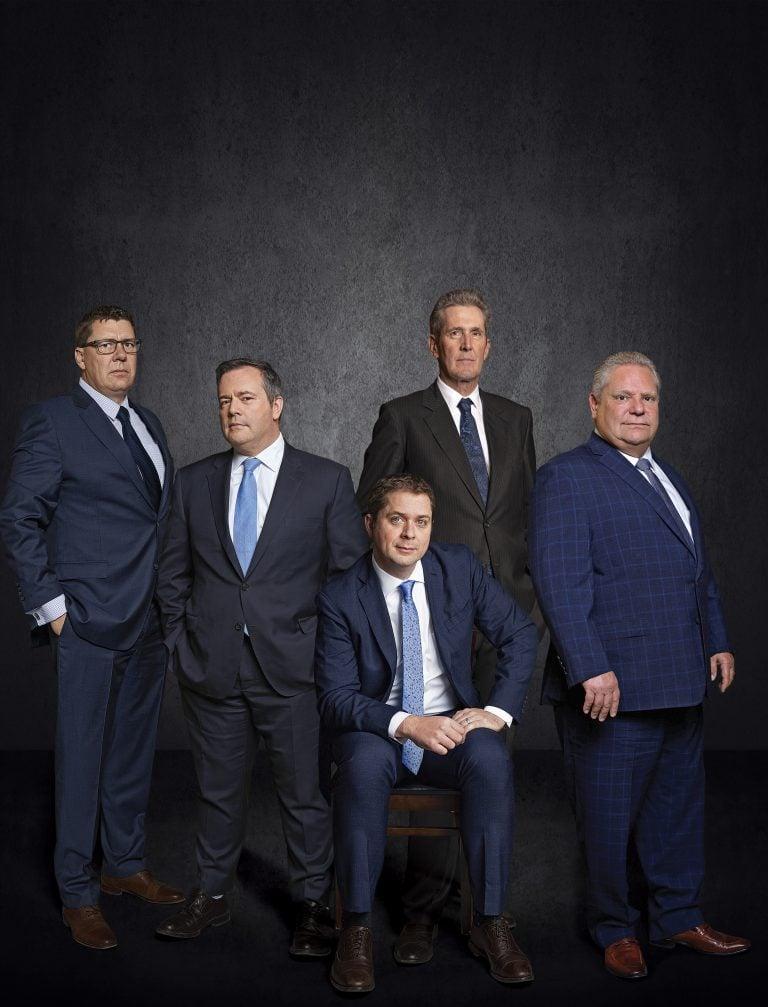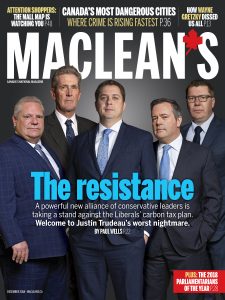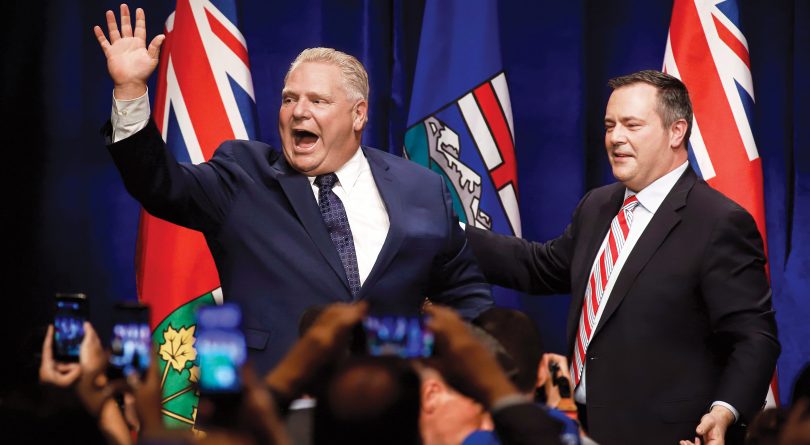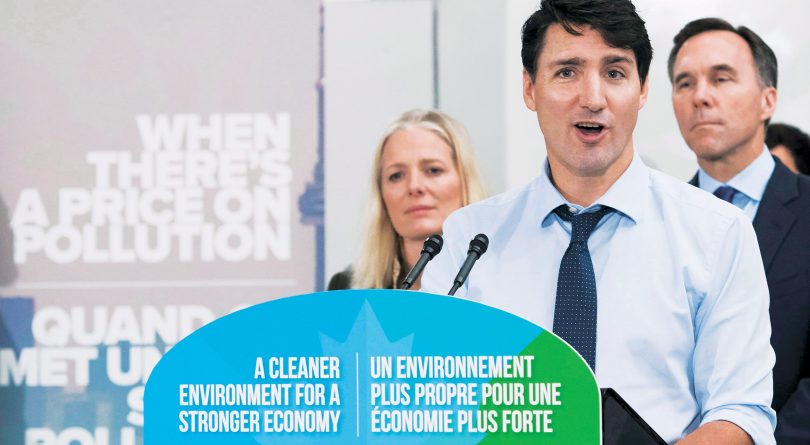A carbon tax? Just try them.
Powerful conservative leaders from across the country are suddenly united against Justin Trudeau’s carbon tax plan. And they’re spoiling for a fight.

Left to right: Saskatchewan Premier Scott Moe, UCP leader Jason Kenney, Conservative leader Andrew Scheer, Manitoba Premier Brian Pallister, Ontario Premier Doug Ford. (Photographs by Yannick Anton, Réjean Brandt, Jeremy Fokkens, Jennifer Roberts, Carey Shaw; Photo Illustration by Stephen Gregory)
Share
Scott Moe had been the premier of Saskatchewan for all of a week when he ran into Jason Kenney at the Manning Networking Conference in February of this year, at a downtown Ottawa convention centre.
The Manning conferences have lost some of their cachet as annual gatherings of the Canadian conservative clan. Turns out it can be a hard clan to gather. When he was Canada’s prime minister for a decade, Stephen Harper made it clear he didn’t appreciate outside advice, and since Harper left, the conservative movement hasn’t managed to coalesce behind a single compelling leader. But it’s still a congenial meeting spot for conservatives of various stripes. And there was much to discuss.
Kenney figured a window of opportunity was opening for him and Moe. If charismatic leadership was lacking, perhaps a team approach would work.

Since the autumn of 2017, Kenney, the intelligent and workaholic former federal minister of immigration under Harper, had been the leader of a new United Conservative Party in Alberta. He was, and remains, the man likely to become Alberta’s next premier after an election expected in May 2019. He was presenting himself as the real champion of Alberta’s energy industries, especially the beleaguered oil sands, whose suffering amid a worldwide slump in oil prices had led to the astonishing election of Rachel Notley’s Alberta NDP in 2015.
Notley had argued that Alberta would face less resistance, as it tried to export oil-sands product, if it was seen to be a more active defender of the environment. She had gone so far as to implement a provincial carbon tax. And like every premier in the country except one, she had joined Prime Minister Justin Trudeau in signing the Pan-Canadian Framework on Clean Growth and Climate Change in 2016. That agreement committed every province to putting a price on carbon consumption by 2018—and added that if any province didn’t, Trudeau’s federal government would put a tax on carbon in that jurisdiction, whether the provincial government liked it or not.
The lone holdout had been Scott Moe’s predecessor, Brad Wall. He would not accept a carbon-pricing mechanism, whether it be a simple tax on burning fuel or a more elaborate cap-and-trade formula, which would allow businesses to trade pollution permits but which would amount to the same as a tax. And neither would Wall sign a document granting Trudeau the right to tax Saskatchewan residents over his objections. Moe, who had been the environment minister in Wall’s government, maintained Wall’s opposition to a carbon tax when he took over as premier. He was preparing a court challenge against a federal carbon tax on grounds of constitutional jurisdiction.
Over dinner near the Manning conference’s Shaw Centre convention venue, Kenney and Moe talked about lining up some reinforcements. “We talked at length about the need to create a coalition at the provincial level,” Kenney said recently in a telephone interview. “Saskatchewan itself had been bravely taking this fight on its own and had been isolated around the premiers’ table. Premier Moe was very happy to have a strong ally in our Alberta opposition. But we had both identified how important it was to get a prospective Ontario PC government on side.” Here the opportunity was fresh. Ontario Progressive Conservatives don’t like taxes any more than conservatives anywhere do, but for more than a year, Patrick Brown, the party’s leader, had corralled his party into accepting Trudeau’s carbon tax plan. Revenue from the tax, transferred to Ontario, could provide funding for the rest of Brown’s platform, he argued. The party grumbled and acquiesced.
But at the end of January, two weeks before Moe’s dinner with Kenney, CTV News broadcast serious accusations of sexual assault against Brown from two former acquaintances. (Brown has denied the allegations.) Brown resigned the leadership within hours. And then things started to happen very quickly indeed.
“I had some background discussions with PC candidates [to replace Brown as leader],” Kenney said. “Doug Ford actually called me when he first launched his campaign to ask for advice on these issues. And I kind of walked him through the Saskatchewan strategy, the judicial reference and some of the legal and political dynamics. He came out very strongly on this issue, challenging Patrick Brown’s platform position.”
At first, most of Ford’s opponents were inclined to support a carbon tax, or at least to be less vociferous than he was in their objections. The Ontario PCs are a broad coalition, and Brown’s logic made sense to political moderates like Christine Elliott and Caroline Mulroney. But what both candidates soon heard from plenty of ordinary party members was that the grassroots membership actually isn’t that broad a coalition. Any candidate who sought to defend Brown’s capitulation on carbon taxes—now that the party had an unexpected chance to flush the policy along with the leader who had advocated it—would have no chance against Ford.
“I think one of the lynchpin moments was when Caroline Mulroney followed [Ford and Elliott] in opposing the carbon tax,” Kenney said. “So you had certainty at that point that the Ontario PC party, then likely to become the government, would become a major ally.”
READ MORE: The fate of Trudeau’s carbon tax is in voters’ hands now
It can seem that opinions on the choice of a carbon tax are so deeply entrenched that there’s no point in even debating: the Liberals are for a carbon tax, and if you agree, so do most of your friends and everyone you read on Twitter, so surely only a few Conservative diehards and some reprobate Sun newspaper columnists are holding out. But in fact the momentum lately has been going the other way.
There used to be Conservatives who favoured putting a price on carbon. They have lost in a rout. Harper campaigned in 2008 on a promise to implement a cap-and-trade regime that would have been functionally equivalent to a carbon tax in that it put a price on carbon emissions. The internal party campaign to select his successor as Conservative leader featured a serious candidate, Michael Chong, who wanted a carbon tax. The largest provincial conservative party in the country, Ontario’s, wanted a carbon tax until it didn’t. And Brian Pallister, Manitoba’s Progressive Conservative premier, planned to implement a carbon tax until Trudeau stood next to him in Winnipeg and congratulated him for being so enlightened, at which point Pallister promptly yanked any hint of a carbon tax from his climate plan. Add this to the list of incidents that suggest that on intergovernmental relations, the Prime Minister is developing a reverse Midas touch: everything he touches turns to lead.
(Pallister, like every provincial conservative profiled here, is eager to point out that he does in fact have a plan to combat carbon dioxide emissions. “We’re taking action to fight climate change, but we reject the federal government’s imposition of a two-tier carbon tax scheme,” he told Maclean’s. “Our climate and green plan focuses on cleaner water, conservation of nature, economic opportunity and effective steps to reduce emissions.” It is only the specific mechanism of putting a market price on carbon consumption that Pallister opposes—although, since that’s precisely the mechanism the Trudeau Liberals favour, there’s more than enough ammunition in that disagreement for serious political disputes.)
Things have gotten so weird lately that even non-conservative governments have become shaky allies or outright opponents for the Liberals. After a court decision blocked construction on the Trans Mountain pipeline, Alberta’s NDP Premier Rachel Notley said she would no longer participate in the Pan-Canadian Framework until the Trudeau government “gets its act together.” And while the four Atlantic provinces, all governed by Liberals (though that could change any day after September’s photo-finish election in New Brunswick), have not been labelled by Ottawa as delinquent in offering satisfactory carbon-pricing schemes, it’s far from clear they’ll deliver plans Ottawa can accept over the medium term. Even sympathetic premiers are just too leery of being seen to implement a new tax.
“I think Atlantic governments have been generally trying to keep their heads down,” Kenney said. “They’re very dependent on federal transfers, don’t like to take on Ottawa, but this doesn’t make much sense for their economies. Most of them are resource economies, and this tax is particularly damaging to those kinds of economies.”

Provincial conservative leaders and their federal counterpart, Opposition Leader Andrew Scheer, are not merely basking in mutual admiration for their opposition to a carbon tax. They are working together actively.
Scheer and his Alberta MPs, who are nearly one-third of the total Conservative caucus, met in Calgary with Kenney’s UCP caucus during this summer’s Calgary Stampede. “We are united in stopping the Trudeau-NDP agenda,” Kenney noted about the meeting on his Instagram account. A guest speaker was Stephen Harper, who had said several weeks earlier at public speeches in Lloydminster and Leduc, Alta., “Let the other guys do a carbon tax, because we can all win the next federal and provincial elections on that issue alone.”
One of Ford’s first trips outside Ontario as premier was to Alberta and Saskatchewan, where he met with Moe and joined Kenney at an anti-carbon-tax rally. Rod Phillips, Ontario’s environment minister, visited Winnipeg a few weeks later to coordinate with his Manitoba counterpart on climate policy.
All of this cross-border traffic in carbon tax skeptics is vexing to Dominic LeBlanc, whom Trudeau appointed in July as his intergovernmental affairs minister. “I was surprised that Mr. Ford was campaigning for Andrew Scheer with the United Conservative leader in Alberta,” LeBlanc told reporters shortly after the Ontario premier’s Western swing. “If I was worried about a problem with my children’s education in a public school in Ontario or I was on a waiting list at a hospital, I might find it more useful to see the premier here worrying about those issues.”
The Trudeau Liberals say they are merely fulfilling a campaign commitment to put a price on carbon. And it’s true, the notion was mentioned in their 2015 platform. But there are all sorts of ways to make a commitment, and the Trudeau Liberal approach in 2015 was to soft-pedal the notion of carbon taxes spectacularly. The term “middle class” appeared 133 times in Trudeau’s 2015 election platform, including in its title. The word “carbon” appeared only 10 times. Six of those mentions referred to a “Low Carbon Economy Trust,” a pot of federal money that would reward provinces for having policies that cut carbon emissions, like energy retrofit programs for houses. This was the very opposite of a tax. The other mentions of carbon were passing references to a price on carbon that would be agreed harmoniously with cheerful provinces. A Trudeau government would “ensure that the provinces and territories have targeted federal funding and the flexibility to design their own policies to meet these commitments, including their own carbon pricing policies,” the platform said.
Fine, says Moe. His carbon pricing policy is that he doesn’t want to price carbon.
Why were the Liberals so cagey about their policy before the last election, and why are Conservatives lining up to oppose it before the next one? I called a University of Calgary political scientist for thoughts about the politics of all this. The one I selected, Ian Brodie, has the advantage of having been Stephen Harper’s chief of staff from 2006 to 2008. What we lose in objectivity, we may gain in real-world experience.
“There are many, many tools toward greenhouse gas reduction,” Brodie says. Economists believe carbon taxes are the most efficient, in that they impose the lowest overall cost on an entire economy. “There’s nothing wrong with that—but it’s not neutral in how it falls on households. The core political problem, I think, is that it falls on households of commuters and is therefore geographically very efficient at alienating voters in ways that are easy to take advantage of in a first-past-the-post system.”
In other words, to politicians who just generally disagree with Trudeau on everything, the higher cost of a carbon tax for commuters offers an interesting lever in a political fight.
“Jean Chrétien won back-to-back-to-back majority governments by winning basically every seat in that band of suburban and exurban seats around Toronto,” Brodie says. “Those are all, in some sense, swing seats that are up for grabs at every election campaign. And Chrétien, despite signing the Kyoto Accord, was assiduously sure of making sure he had those seats in his column at every election campaign. Doug Ford won most of those provincially by saying, ‘The tax and transportation policies of [Ontario’s previous Liberal government led by Kathleen Wynne] are against you.’
“So a carbon tax takes that 40-seat band around Toronto and puts a big target on almost every household in those ridings. And then you do the same calculation around Vancouver, and you do the same calculation around Montreal, and four, five, six, seven other cities, and you’re talking about a really big political problem for trying to sell a carbon tax.”
This helps explain why Ford has begun saying a carbon tax would “attack commuters, not polluters,” and why Scheer almost immediately followed suit.

But hang on here. The Liberal policy, as confirmed in late October by Trudeau at an event in Ford’s riding with Environment Minister Catherine McKenna standing behind him, isn’t only to tax fuel consumption. It’s to deliver an income-tax rebate in every province where the feds decide the existing provincial policy isn’t sufficient—so far, in Saskatchewan, Manitoba, Ontario and New Brunswick.
The rebates will be funded with all the revenue collected through the carbon tax, whether from individuals or from businesses. But because all the money collected from businesses will go into those rebates for individuals, the amount delivered to the average person will be higher than the amount that person paid in carbon taxes.
Early polling evidence suggests the rebate plan has substantially softened public opposition to carbon taxes. But Brodie is not persuaded voters will stay mollified for long. “The trick is that every time you fill up your gas tank, you feel it. So let’s say 100 times a year, you feel it on the cost side. And then you never feel the uplift on the rebate side.”
In fact, he says, the rebate plan makes the whole thing harder to understand. “The more complicated the revenue-recycling part of it is, the harder it makes it to sell the idea,” he says. He imagines a government that was only going to tax, with no rebate. “ ‘We’re going to pay, I don’t know, whatever it is, 10 cents a gallon in order to save the environment.’ Okay, you may or may not like the idea but at least it’s a proposition. The idea that, ‘Don’t worry, it’s not going to cost you anything because we have this very complicated recycling tax measure that’s going to recycle all that revenue back into your pocket, and it only takes me 25 PowerPoint slides to explain it to you’—I think that doesn’t make the sales job easier, it makes it harder.”
On the day Trudeau announced the rebate plan for the four recalcitrant provinces, McKenna kept an appointment to telephone me for an interview for this article as she was being driven from her hometown of Hamilton back to Toronto. It was the first time I had interviewed her since the 2015 election. The federal environment minister is an old friend of mine from long before her days in politics, as is Phillips, her Ontario counterpart and political opponent. Life gets weird when your friends start running for office.
Given that she’s the Trudeau government’s frontperson for a crucial national debate, McKenna has been keeping a low profile on carbon pricing. I had looked for a big recent speech from her on the topic; her government of Canada website has none. She said the changes of government in Ontario and, perhaps, elsewhere had made the policy a moving target for a while. “We wanted to get it right. But I know that people were wondering about the details, so we had signalled a bit. But I feel much better today, where we’re actually out with our plan, saying what it means.”
What did she make of the emerging conservative common front, across much of the country, against her policy? “I think it’s unfortunate. Because when I think about conservatives, I think that they want to be part of conserving limited resources, they want to save people money, and they care about the environment.”
She plans to keep working with businesses and municipal mayors even if provincial governments don’t co-operate. “It’s the same strategy that, quite frankly, we used with the United States” after Donald Trump was elected president. “I just wish it wasn’t a partisan issue, because there’s a very good economic case and there’s a clear—very clear—moral case to take action.”
In a separate interview, Phillips struck a similarly wistful tone. “We have a different point of view, and I wish we could have a conversation about hitting the objectives the Trudeau government has agreed to, not to do it in the one way they think is most important.” He notes that Sir David King, a long-time special envoy of the U.K. foreign minister on climate change, has called for a global carbon tax of $150 a tonne. The Trudeau Liberals have no intention of going anywhere close to that level. “If you’re not willing to do that, then people get quite cynical about why you’re raising money,” he says.
It’s not axiomatic that just because Canada’s conservative parties are lining up behind this issue, they are sure of winning on it. Trudeau has read his share of premature political obituaries before now. During the 2015 campaign, when Trudeau announced a plan to run budget deficits, the cover line on the next day’s Winnipeg Sun read, “POLITICAL SUICIDE.” And the Liberals believe that since the 2008 campaign, when Harper soundly defeated Stéphane Dion on this same issue, Canadians have had a decade to get much more worried about climate change.
But elections have to be about something, and forces tend to align according to perceived opportunity. Even at his least popular, Harper didn’t face such a determined coalition of federal and provincial Liberals working so hard to defeat him on a key policy. Trudeau will be tested in 2019, not only by Scheer but by all the Conservative leader’s provincial allies.
CORRECTION, Nov. 8, 2018: An earlier version of this story misstated the location of a speech given by Stephen Harper this year.